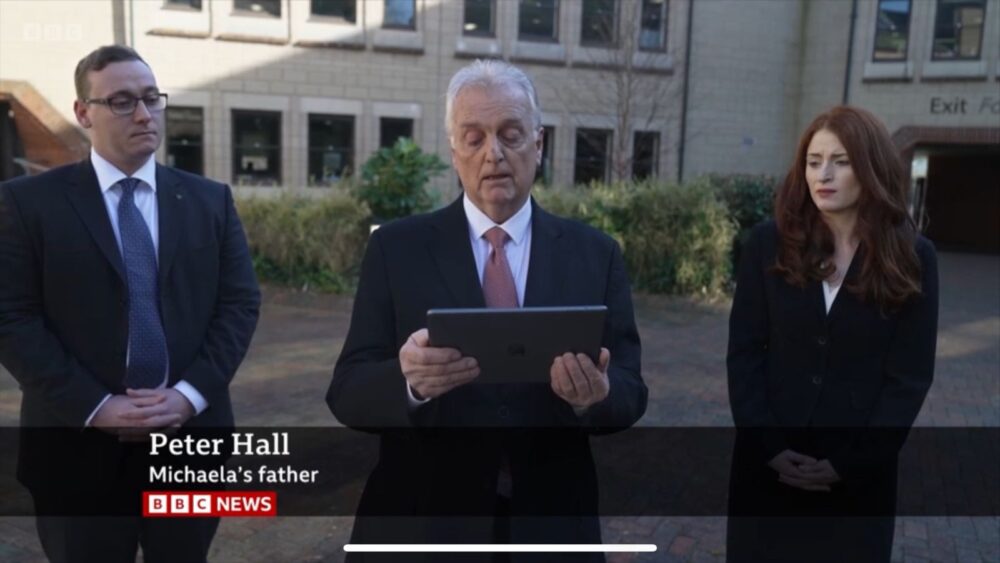Michaela Hall Inquest concludes
26th Mar 2024
The Senior Coroner for Cornwall and the Isles of Scilly, Mr Andrew Cox, has given his judgment and conclusion after hearing the extensive inquest into the death of Michaela Hall. Scarlett Milligan, of 39 Essex Chambers, acted for Michaela’s bereaved family, instructed by Corey Smith of HCC Solicitors.
Michaela was the victim of a domestic homicide, having been consistently abused by her partner for two years. The Senior Coroner examined the system that existed to safeguard Michaela and has made a number of critical findings against state agencies involved in Michaela’s case, including a finding that probation failings were causative of Michaela’s death.
Michaela was a much-loved mother of two who had given up her glamorous and senior career, working in cabin crew and travelling to exotic locations, to be closer to her children.
She completed a foundation degree in law with criminology and was passionate about helping ex-offenders reform their life. In that latter role she met her partner, who had an extensive history of offending, of violence, and of drug and alcohol addiction. Michaela thought she could help him.

Michaela Hall (with kind permission of the family)
During their relationship, which began almost two years before her death, police had 34 entries on their systems about the extensive abuse influenced on Michaela by her partner. There were several hallmarks of coercion and control.
Her abuser was arrested ten times, but no evidence led prosecutions took place. Two assaults were pursued in March 2021 (due to Michaela deciding to give a statement in support of the proceedings because of the escalation in the violence toward her, including strangulation and threats involving weapons).
Michaela was referred to a specialist multi-agency risk assessment conference on six occasions between October 2020 and April 2021 owing to the risk to her being assessed as life-threatening.
The inquest examined whether opportunities were missed to prevent Michaela’s murder. The evidence heard by the inquest and the Senior Coroner’s findings are necessarily lengthy given the breadth and complexity of the case, but included:
- Michaela should not have been cleared to work with the man that killed her. Had this not happened, she would never have met her killer.
- Children and adult social services were disjointed, and information was not shared as it should have been.
- Safeguarding enquiries to ascertain whether Michaela’s domestic abuse gave rise to care and support needs under the Care Act 2014 were not properly undertaken and lacked curiosity. There was a failure to consider important information pertaining to Michaela’s mental state, which meant that assessments and actions were not properly informed.
- In respect of the numerous police calls, intelligence, and attendances in the two years before Michaela’s murder, not everything that could be done was, in fact, done.
- There were shortcomings in how the police handled the emergency call in respect of the fatal attack, which meant that: the call was not passed to police as soon as it could be; police were available but not allocated to the call immediately, resulting in a delay of at least twenty minutes; and the call was not marked as a high risk call that warranted supervision. This also led to a delay in further follow up visits to check Michaela’s welfare.
- The officers who attended Michaela’s home in response to the emergency call expressed their concerns about Michaela, but did not force entry into the property when their knocks went unanswered. The Senior Coroner found that there were grounds in law to do so, and that the officers should have entered the property, and should have discussed the decision with a supervisor if they found it a difficult decision.
- Michaela’s murderer was incorrectly risk assessed by probation services following his conviction for assaults on Michaela in April-May 2021. He should have been assessed as posing a high risk of serious harm to Michaela. Several opportunities for line managers and others to correct the error were missed. This gave rise to a number of other probation shortcomings: failing to recommend a custodial sentence to the court, proffering a community order instead; not considering options for more intensive scrutiny in the community; and allocating him an inappropriate level of probation officer, who did not have time to meet with him before going on leave – during which time he missed a probation appointment (a known risk factor) and Michaela was murdered.
- Multi-agency working was not always joined up, information sharing could have been better, and that the agencies’ assessment of the risk posed to Michaela was at times contradictory.
Peter Hall, Michaela’s father, said:
“It broke our hearts to hear what we already knew – that if these errors had not happened that our Michaela would not have died that day. The failings and shortcomings we have witnessed have truly shocked us.
“It is recognised that domestic abuse goes largely unreported, yet there are 2.1 million reported victims in the UK. Statistics suggest that there will be 35 assaults before a victim calls the police. A domestic abuse call is made to the police every 30 seconds. 1 in 5 adults will experience it during their life. Two women are murdered every week. What more will it take.
“I am sorry to say that we have learned the hard way how woefully ill-equipped these risk-critical agencies are to protect us. Our beautiful and loving daughter Michaela paid the ultimate price for their failings.”
Corey Smith, Associate at HCC Solicitors, said:

Corey Smith of HCC Solicitors
“The senior coroner was clear that there were failings from multiple state agencies, some of which were causative to Michaela’s death. These were not one-off individual errors but speak to various systemic issues from multiple organisations who are there to protect people like Michaela.
“Michaela’s parents showed tremendous strength throughout the inquest and were a true inspiration. They will be tremendous advocates for the changes that are required to protect victims of domestic violence and we can only hope that serious lessons are learned for the sake of the millions of domestic abuse victims in the country
“We thank the senior coroner for his diligence with this inquest and the family requests privacy while they reflect on the senior coroner’s lengthy and well-reasoned judgment.”
